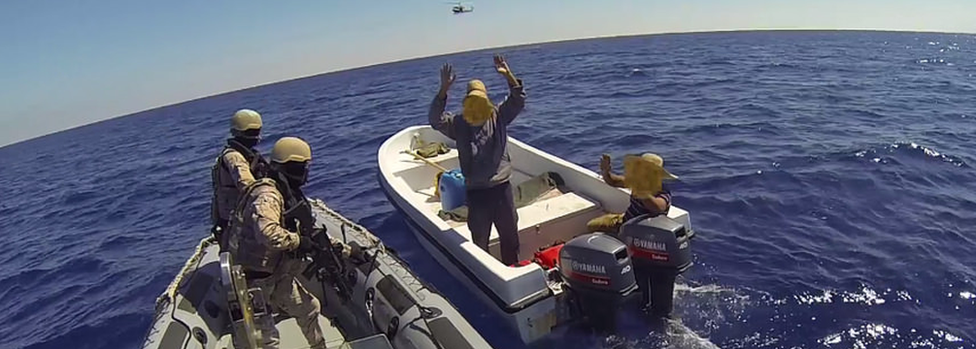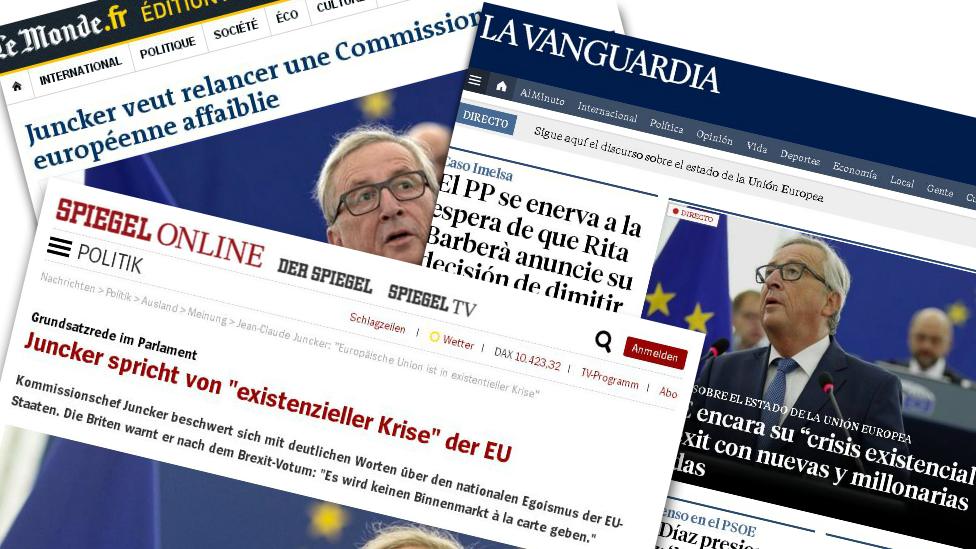Juncker proposes EU military headquarters
- Published
Mr Juncker said an EU military force would be a complement to Nato
The European Union needs a military headquarters to work towards a common military force, the Commission president has told MEPs in Strasbourg.
Jean-Claude Juncker said the lack of a "permanent structure" resulted in money being wasted on missions.
Part of his annual state of the union address, external was devoted to the UK's unexpected vote to leave the EU.
He insisted that the bloc was not at risk but called for Brexit negotiations to take place as quickly as possible.
Modelled on the state of the union address by the US president, the Commission president's annual speech was introduced in 2010 to detail the state of the EU and future legislative plans.
Won't a common military force interfere with Nato?
The Brexit vote has given added impetus to plans for greater defence co-operation, because the UK has always objected to the potential conflict of interest with Nato.
But Mr Juncker said a common military force "should be in complement to Nato". "More defence in Europe doesn't mean less transatlantic solidarity."
A European Defence Fund would stimulate military research and development, he said.
Why a military HQ? By BBC defence correspondent Jonathan Marcus
All EU members have military forces; most are also members of Nato; and several have extensive experience of operations abroad, from peace-keeping to war-fighting.
The real question is how to organise these component parts to get greater security. Mr Juncker insists that the EU must have a role here.

Many member states are taking part in an EU naval mission off the coast of Libya
He wants to improve EU command and control facilities and appears to be suggesting that EU civil and military aspects of a given mission should be run out of the same headquarters.
He also insists that whatever the EU does it should not detract from Nato. But defence resources are finite. His critics will say nothing should be done that duplicates existing Nato activities, as that sends a signal of disarray in Western ranks to Moscow.
Read more here: Brexit vote revives dream of EU army
What sort of missions does the EU run?
Since 2003 the EU has launched some 30 civilian and military operations in Europe, Africa and Asia - under the Common Security and Defence Policy (CSDP). Sixteen are still going on, including six military operations::
Its mission in Bosnia and Herzegovina oversees the implementation of the 1995 Dayton Agreement which ended the Balkan Wars. It replaced Nato forces in 2004
Counter-piracy operation Atalanta began off the coast of Somalia in 2008
In 2015, Operation Sophia began targeting migrant-traffickers, external in the Mediterranean
The EU also has military training programmes in Somalia, Mali and the Central African Republic
What did we learn on Brexit?
On future Brexit negotiations, Mr Juncker warned that the UK could only have unlimited access to the single market if it accepted free movement of people and goods. "There can be no a la carte access to the single market," he said.
The single market has dominated the Brexit debate in the UK.
Prime Minister Theresa May distanced herself last week from remarks by Brexit minister David Davis, when he said remaining in the single market would be "very improbable" if it meant giving up control of British borders.
What was Juncker's main message? By BBC Europe Editor Katya Adler
Jean-Claude Juncker and his team agonised over the wording of Wednesday's speech.
The UK's vote to leave the EU is undoubtedly one of the biggest crises the bloc has ever faced but Mr Juncker was determined not to dwell on it.
Jean-Claude Juncker: No "a la carte" access to EU internal market for UK
There were few words on Brexit. His main message: "The European project continues. Let's choose to look forward. Be positive."
Applause resounded around the chamber of the European Parliament but how will the voters outside react?
Are they even listening? The drumbeat of nationalist, Eurosceptic populism reverberates around the continent.
Public trust in the establishment is low - whether traditional politicians, bankers or EU bureaucrats - and Mr Juncker is an unelected president.
What else did he say?
Mr Juncker admitted the EU was facing an "existential crisis", and he also warned that splits in the union had left space for "galloping populism".
In a blunt criticism of recent attacks on immigrants in the UK, he said he would "never accept Polish workers being beaten up, harassed or even murdered on the streets of Essex".
Mr Juncker said the EU had to deliver "concrete results" including:
Maintaining stability and sharing the burden of economic downturn, such as doubling investment in the EU to €500bn (£425bn; $560bn) in the next five years and creating an investment fund for Africa
Creating solidarity in the Union - such as protecting unaccompanied minors migrating to the EU - but Mr Juncker said this must "come from the heart" and could not "be forced or imposed"
Promoting security including strengthening the EU's borders and promoting greater security co-operation between member states, as well as greater military centralisation.
He urged a renewed focus on the EU as a "driving force that can bring about unification, for instance in Cyprus".
How did MEPs react?

Mr Farage accused the European Commission president of "sticking to dogma"
Anti-EU MEPs lined up to criticise Mr Juncker's rallying cry:
UKIP leader Nigel Farage said it was "the usual recipe: more Europe, in this particular case, more military Europe''
Peter Lundgren of the anti-migrant Sweden Democrats said his country had always been neutral militarily. "We don't want to be forced into this type of military co-operation," he said
But Belgian MEP Guy Verhofstadt, the European Parliament's lead negotiator on Brexit, said the EU still offered the "cure" for "the cancer of nationalism"
- Published14 September 2016

- Published30 December 2020
